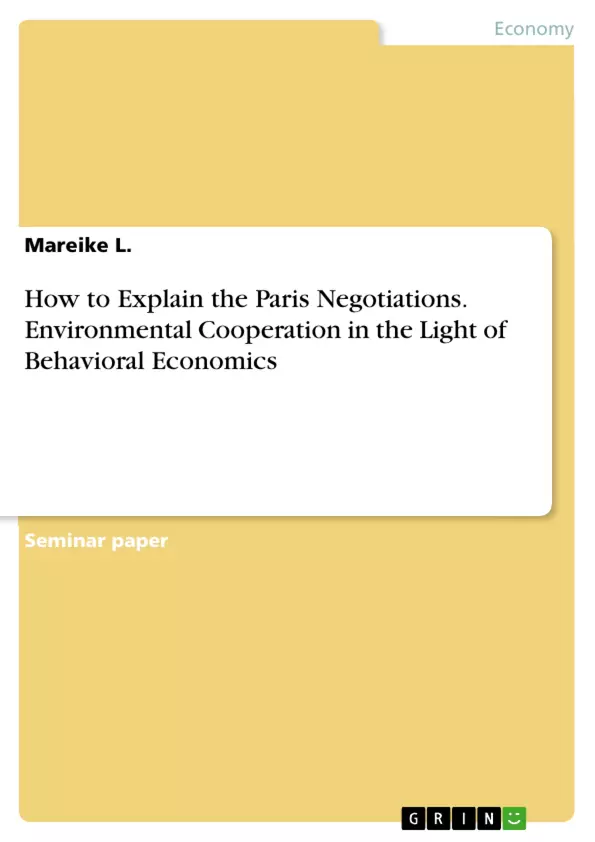One of the biggest challenges of the globalized world is still the establishment and maintenance of international cooperation. The growing interdependency produced by cross-border externalities demand for joint actions in an anarchic world order.
The United Nations (UN) or the international economic system, consisting of the World Bank, the International Monetary Funds (IMF) and the World Trade Organization (WTO), are some examples of mostly successful supranational forms of cooperation. What those institutions not include is the threat of climate change, which is today’s biggest challenge of international matter. With its Report “Limits to Growth” from the year 1972, The Club of Rome not only put the subject of climate change for the first time on the political and scientific agenda but also raised the public awareness of this problem. From this point on, ongoing efforts were made to commonly regulate emissions and control the sustainability of climate goods. Nevertheless, the first binding agreement on climate change, the Paris Agreement, entered into force 44 years after this report, on the 4th of November 2016.
For some political and economic theorists this is no surprise. Following the assumptions of the economic game theory and global governance-approaches, non-cooperative behavior is the consequence of rational decision making. Basic dilemma situations depict the competition about non-excludable goods and foresee the challenges of global climate negotiations.
The latest success on the Climate Conference in Paris challenges these assumptions and raises new questions about human cooperative behavior. While this matter has its origins in the neoclassical approach of game theory, behavioral economists started to examine the phenomenon and question the basic assumption of rational choice. “Homo oeconomicus is also a Homo socialis”.
Aspects of both facets of human behavior shall be analyzed in this paper, in order to explain the mechanisms of cooperation on climate change. The existing literature focuses mostly on only one of these aspects which leads to an incomplete picture of the decision-making process.
Inhaltsverzeichnis (Table of Contents)
- Introduction
- International Cooperation on Climate Change
- Mechanisms of Cooperation
- A Game Theory Approach
- A Behavioral Economics Approach
- Cooperation in Global Climate Negotiations
- Conclusion
Zielsetzung und Themenschwerpunkte (Objectives and Key Themes)
This paper aims to analyze the mechanisms of cooperation on climate change, particularly in the context of the Paris Agreement. It seeks to reconcile the seemingly contrasting perspectives of game theory and behavioral economics, which offer different explanations for human behavior in international negotiations.
- International cooperation and the challenges of climate change
- The role of game theory and behavioral economics in understanding cooperation
- The impact of behavioral biases on climate negotiations
- The success of the Paris Agreement in the face of traditional game theory predictions
- The implications for future climate negotiations
Zusammenfassung der Kapitel (Chapter Summaries)
- Introduction: This chapter sets the stage by highlighting the importance of international cooperation in addressing global challenges, particularly climate change. It discusses the historical context of climate negotiations, from the early awareness of the issue to the ratification of the Paris Agreement.
- International Cooperation on Climate Change: This chapter provides a historical overview of the United Nations Framework Convention on Climate Change (UNFCCC) negotiations, starting with its inception in 1992 and concluding with the adoption of the Paris Agreement in 2015. It discusses key milestones and the evolving international response to climate change.
- Mechanisms of Cooperation: This chapter examines the theoretical frameworks for understanding cooperation in international negotiations. It explores the perspectives of both game theory and behavioral economics, highlighting their respective strengths and limitations in explaining cooperation in the context of climate change.
Schlüsselwörter (Keywords)
This paper explores the key concepts of international cooperation, climate change negotiations, game theory, behavioral economics, the Paris Agreement, and the United Nations Framework Convention on Climate Change (UNFCCC). It examines the role of behavioral biases, rational decision-making, and the complex dynamics of global cooperation in the face of environmental challenges.
- Quote paper
- Mareike L. (Author), 2017, How to Explain the Paris Negotiations. Environmental Cooperation in the Light of Behavioral Economics, Munich, GRIN Verlag, https://www.grin.com/document/444055



